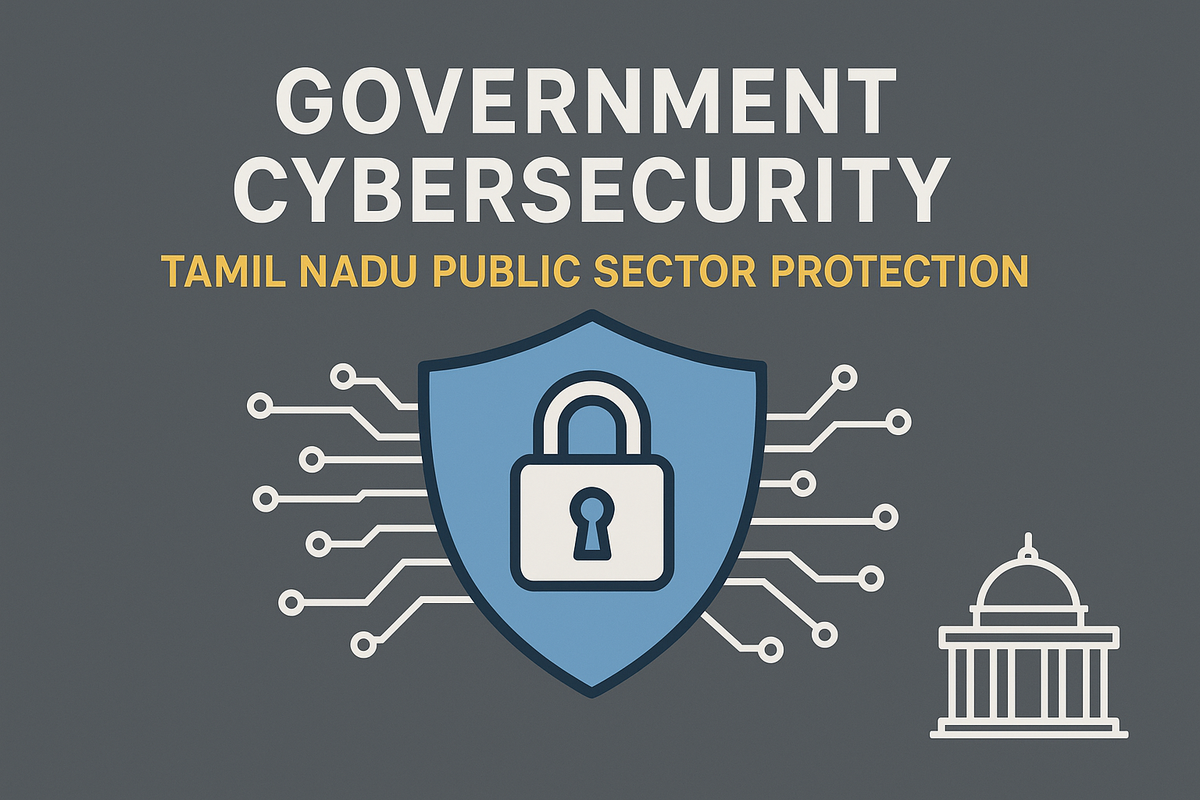Government Cybersecurity: Tamil Nadu Public Sector Protection

Introduction
Tamil Nadu’s government and public sector entities have stepped into an era where cyber threats and digital attacks pose continuous risks to public welfare, public data, and critical digital infrastructure. The unveiling of Cyber Security Policy 2.0 reaffirms the state’s commitment to safeguarding information assets, ensuring service continuity, and establishing resilient e-governance frameworks for millions of citizens.
Tamil Nadu’s Cyber Security Policy 2.0: Evolution and Scope
The government released Cyber Security Policy 2.0 in August 2024, updating the decade-old framework to combat new attack vectors faced by state agencies and public sector units. This policy, created with input from the Centre for Development of Advanced Computing (C-DAC), IIT Madras, and the Tamil Nadu e-Governance Agency, sets strict guidelines for audit, compliance, and monitoring.
Policy highlights include:
- Applicability to all state government departments, PSUs, and affiliated agencies.
- Mandatory standards for third-party contractors and consultants using government data.
- Special focus on protecting critical infrastructure, citizen services, and digital networks.
Strategic Objectives and Institutional Mechanisms
The core objectives emphasized by Tamil Nadu’s cyber policy include:
- Protection and availability of government digital assets.
- Institutional oversight and real-time monitoring of IT infrastructure.
- Comprehensive risk reduction strategies and incident management mechanisms.
A systematic approach is in place for rapid detection, prompt prevention, and thorough investigation of cyber incidents, with institutional arrangements supporting ongoing audits and compliance verification.
Operational Components: Guidelines and SOPs
Tamil Nadu’s policy provides standard operating procedures (SOPs) for the following:
- Digital authentication and e-signature implementation to secure government communications and document verification.
- Email and password security standards across agencies.
- Social media policy for managing official communication and preventing information leaks.
- Data backup and recovery with multi-location storage and regular restoration testing.
- Annual information security audits for timely vulnerability detection.
Incident Response and Workforce Training
A robust incident response system ensures:
- Every department must nominate officials to coordinate with Tamil Nadu’s Cyber Security Incident Response Team (CSIRT).
- Mandatory annual cyber incident management training for government staff.
- Real-time risk assessment to identify and address threats targeting applications and critical assets.
Compliance, Auditing, and Risk Management
Effective compliance encompasses comprehensive frameworks for ongoing monitoring, security reviews, and performance multilevel audits. The focus rests on:
- Establishing institutional mechanisms for regular security assessments.
- Application of risk management methodologies for critical infrastructure and citizen-facing portals.
- Mandated compliance requirements for government partners and vendors.
Statewide Incident Detection and Threat Intelligence Integration
Integration of advanced SIEM (Security Information and Event Management) platforms, network monitoring tools, and endpoint protection solutions strengthens real-time incident detection and threat hunting. The policy sets a precedent for adopting:
- Network security standards (segmentation, continuous monitoring).
- Centralized log management and threat analytics.
- Collaboration with national entities like CERT-In for vulnerability assessments and penetration testing.
Sector-Specific Notes: E-Governance, Utilities, and Healthcare
The Tamil Nadu public sector includes verticals such as e-governance platforms, energy utilities, healthcare networks, and transport systems. Cybersecurity measures focus on:
- Enhancing security and privacy for citizen databases and service portals.
- Protecting utility grids and SCADA systems from cyber-physical threats.
- Applying specialized information security practices to healthcare and educational infrastructure.
Role of National Frameworks and Federal Guidance
Tamil Nadu’s approach is reinforced by:
- Adoption of the National Cyber Security Policy (NCSP) and CERT-In Guidelines for public sector entities.
- Alignment with best practices from international bodies and Indian central agencies.
- Integration of security guidelines covering network security, application security, data integrity, third-party risk, and continuous assessment.
Sectoral Compliance Requirements
Public sector units and government departments must:
- Implement multi-factor authentication and single sign-on mechanisms for better identity management.
- Enforce strict role-based access control and periodic user privilege reviews.
- Monitor third-party network traffic and use secure VPN tokens to restrict access.
- Disable unneeded device sensors in secure zones (GPS, Bluetooth, NFC) to reduce risk exposure.
Emerging Technologies: AI, Blockchain, and Secure Digital Identity
Tamil Nadu was the first state in India to release dedicated policies for AI and blockchain alongside cybersecurity, using frameworks like the TAM-DEF for evaluating digital systems. Digital ID delivery projects leverage blockchain to secure governance processes and establish trusted data anchors, with an enterprise approach to state-wide security governance.
Future Directions and Government Initiatives
Key future strategies include:
- Expanding cyber awareness and training for public servants, contractors, and partners.
- Fostering innovation in security technologies for public sector resilience.
- Continuous policy updates to address new cyber threat vectors and evolving regulatory landscapes.
Conclusion
Tamil Nadu’s public sector cybersecurity landscape reflects a continuous commitment to resilience, proactive monitoring, incident readiness, and responsible digital governance. Policy updates, institutional mechanisms, and adoption of innovative technologies are shaping a safer digital future for citizens and critical infrastructure across the state.
Take the Next Step with CodeSecure Solutions
Cyber threats are growing more sophisticated every day. With a trusted partner by your side, you can safeguard your business while focusing on what truly matters—growth and innovation.
At CodeSecure Solutions, we deliver comprehensive cybersecurity services in Chennai, uniquely tailored for startups, SMEs, and enterprises:
- Vulnerability Assessment & Penetration Testing (VAPT)
- Network Security Solutions
- Compliance Support (ISO 27001, PCI-DSS, HIPAA, DPDP Act, GDPR)
- Cloud & Endpoint Protection
- Security Awareness Training
No matter your industry or size, CodeSecure customizes solutions to fit your needs—ensuring your data, reputation, and operations remain secure.
Ready to Strengthen Your Defenses?
- 📞 Call: +91 73584 63582
- ✉️ Email: vapt@codesecure.in
- 🌐 Visit: www.codesecure.in
Stay secure. Stay informed. Choose CodeSecure Solutions—your partner in cyber resilience.
